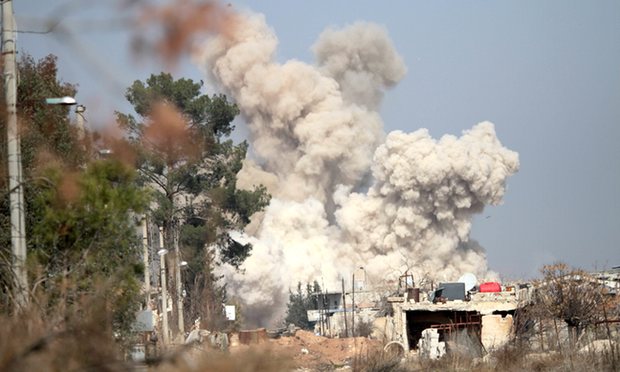
The scene after a raid targeting rebels in Daraya, south-west of Damascus, on 24 February. Photograph: Xinhua/Rex
Syria faces a crucial day on Friday as combatants in the country’s 5-year-old civil war are asked to meet a deadline to sign up to a “cessation of hostilities” agreement due to take effect at midnight Damascus time, 10pm GMT.
Heavy air strikes were reported to have hit opposition-held areas to the east of Damascus as fighting continued across much of western Syria on Friday, hours before the U.S.-Russian plan to ceasefire.
The Syrian Observatory for Human Rights monitoring organization reported at least 10 air raids targeting the town of Douma in opposition-held Eastern Ghouta near Damascus, and reported artillery shelling by government forces in Hama and Homs provinces.
Fighting also resumed at dawn between opposition and government forces in the northwestern province of Latakia, where the Syrian army and its allies are trying to recapture more territory at the border with Turkey.
Rescue workers in the opposition-held area, reported on their Twitter feed civilian casualties but did not say how many. Syrian military officials could not immediately be reached for comment.
The UN Security Council is preparing on Friday to pass a resolution endorsing the US-Russian plan to halt the fighting and naming the key parties to the ceasefire, which excludes ISIS and the al-Qaida-linked Nusra Front and any other terrorist groups named by the UN Security Council.
The government has agreed to the plan. The main opposition alliance, which has deep uncertainties about the terms, has said it is ready for a two-week truce to test the intentions of the government and its Russian and Iranian backers.
The Syrian opposition political umbrella group, the High Negotiating Council, has expressed its concern over the exception being abused with US and British envoys. They fear the government will continue targeting rebels on the pretext they are jihadists.
“We are against the terrorism in the form of Isis and Nusra, but we don’t want Russia to target the moderate factions under the excuse of targeting Nusra,” said spokesman Salem al-Meslet.
Damascus has made clear it will continue to target ISIS and the al-Qaeda-linked Nusra Front. The government says the agreement could fail if foreign states supply opposing parties with weapons or use the truce to rearm.
Eastern Ghouta is frequently targeted by the Syrian army and its allies. It is a stronghold of the Jaish al-Islam group, which is represented in the main opposition alliance, and has been used as a Launchpad for rocket and mortar attacks on Damascus.
U.S. President Barack Obama said on Thursday the United States was determined to try to make the deal work but that “there are plenty of reasons for skepticism”.
